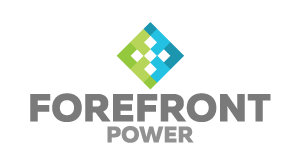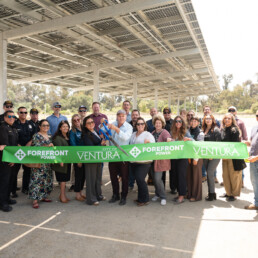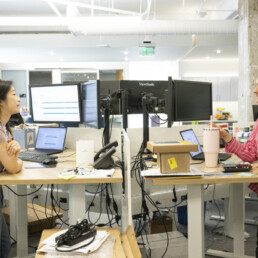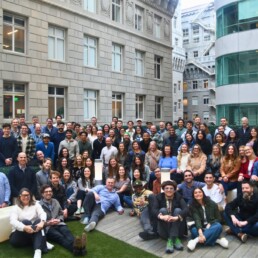We spoke to ForeFront Power’s Vice President of Project Finance and Business Development Bryan Eckstein to learn more about him and his thoughts on LGBTQ+ representation during Pride Month.
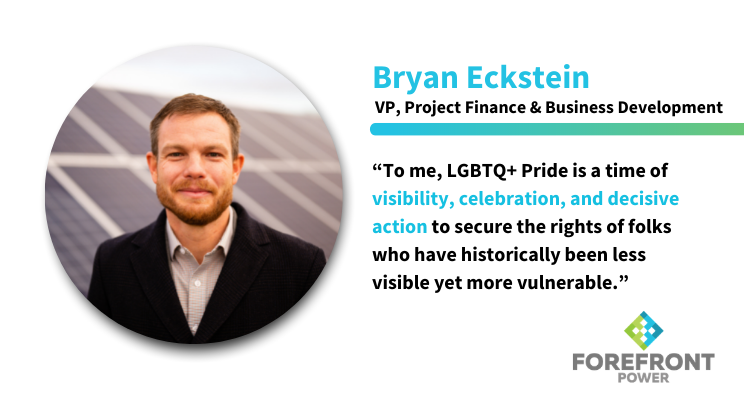 Where are you from originally?
Where are you from originally?
BE: As I kid, I grew up in rural West-Central Louisiana at an Army base called Fort Polk. I spent most of my formative years in the Shenandoah Valley of Virginia.
What did you want to be when you grew up?
BE: Since my father was in the U.S. Army, I did a lot of Army-like activities when I was a kid, like building forts and sending my younger brothers and the neighborhood kids on missions. I thought I was most likely going to be in the Army, too. Then I got really excited about water quality issues growing up. When I was a kid in the early 90s you could send in UPC labels from Rice Krispy Treats boxes to preserve your own “plot” of the rainforest, and it was also the era of Captain Planet on TV.
How did you end up working in the energy field?
BE: I focused on how the built environment affected water quality throughout high school and college. My first job out of college was for an environmental consulting company, providing support via the U.S. EPA‘s technical support to the United Nations on global climate change initiatives during the Bush administration. I was slowly moving into energy given the sector’s contributions to greenhouse gas emissions, but the real transition came after doing regulatory work. For one client in particular, we were trying to implement a renewable portfolio standard for the state of West Virginia, a coal economy state. The regulated industry came back to us and said the proposed provisions were not “financially viable.” I didn’t have the tools to negate that argument at the time, so I went to grad school to learn about the world of finance, with the goal to make it work for the environment.
How did you end up at Forefront Power?
BE: I’ve been a part of ForeFront Power since before it was ForeFront. I initially came to California to work for its predecessor company, SunEdison. The first time I lived in San Francisco was the summer of 2013 when I interned with another renewable energy company called Recurrent Energy. I also had a really strong mentor during graduate school who happened to be part of the LGBTQ+ community like myself. He had previously represented an investor in Recurrent and helped guide me into the renewable energy industry. That internship confirmed my desire to live in San Francisco. During my last year of grad school, my focus was finding a fit for both that geography and a renewable energy company that was really dynamic. SunEdison was that company for me at the time with an IPO on the horizon and after 3 years of working (and interesting corporate experience on the ‘solar coaster’), we became ForeFront Power in 2017.
What is your current role at ForeFront Power?
BE: I’m Vice President of Project Finance and Business Development. In my role, I help bring more sources of capital to support the development of renewable energy and help launch new products and service types. I’m figuring out how to structure new technologies like energy battery storage, and how to contract around any risks in new service offerings. While some of my work is very forward-looking, it’s also core to the company’s operations because by attracting a lower cost of capital, we can provide solar for more customers.
With the new administration and the big push around climate and infrastructure, what do you envision for the future of the energy industry going forward?
BE: We are fully on track to make a full transition to cleaner sources of energy. It’s undeniable when you look at the statistics about new generating capacity added year over year. For the past few years, solar and wind have been outperforming more traditional thermal fossil fuel type energy generators. It’s an exciting future where the energy industry will be able to serve more folks through lower costs and technological advancements that will allow the grid to rely increasingly on renewable energy without backup from fossil fuels.
What do you see as ForeFront Power’s role in building this new energy future?
BE: ForeFront Power is positioned as a total energy solution provider. We don’t just go out and find land for our projects like a commercial real estate developer would. We go deep into our customers’ uses of energy, figuring out how they can make reductions that will save them costs while also having a positive impact on the environment. We’re really there to be a full partner, providing huge operational benefits for our customers while helping herald in this post-fossil fuel future that we’re all depending on to mitigate the effects of climate change.
June is Pride Month in the US. What does Pride mean to you as a member of the LGBTQ+ community?
BE: To me, LGBTQ+ Pride is a time of visibility, celebration, and decisive action to secure the rights of folks who have historically been less visible yet more vulnerable. In this moment, we’re thinking about the intersection of identities, like trans people of color who still suffer from the most base discrimination and even lethal acts of violence to this day. Pride is a time for us to be who we are, to celebrate what’s been accomplished. But then, more importantly, we push forward and try to win some of the same protections that have benefited some segments of our community more than others.
How have you seen the energy industry evolve in terms of allyship and the representation of LGBTQ+ energy professionals?
BE: There’s always been an informal LGTBQ+ network in the industry. I was fortunate enough to have a grad school mentor who is both a veteran of the industry and gay. He helped introduce me to the informal network of the LGBTQ+ community early on. Now, there are more formal organizations and events specific to the LGBTQ+ community in the broader energy industry. One example is the LGBTQ+ MBA conference called Reaching Out MBA. It’s a major business recruiting event where I helped organize a panel discussion among practicing professionals to share their experience as LGBTQ+ individuals working in the industry, and to provide their advice to job seekers. Most recently, the last Solar Power International Conference in Salt Lake City hosted the first formal LGBTQ+ networking reception, so the community really has arrived with a network in place and high visibility, which is great to see.
What did it mean to you to have a mentor who was LGBTQ+ as well as a community of LGBTQ+ energy professionals?
BE: One’s support network matters for different reasons at different points in your career. At the time when I was fairly young and unestablished, it was intimidating to go into a new career, especially when you felt like you had to present strength and conformity in many ways. To have a mentor from the LGBTQ+ community at least gave me a mental image of how I could succeed in the space where I wasn’t sure who else was there. Then, as with any community, it’s nice to know you have friends around. It does give an inroad in a place where you might see a bunch of faceless strangers, and add some connection with the broader industry you’re part of.
What tangible steps do you think energy organizations can take to advance DEI and improve the quality of life for their LGBTQ plus staff?
BE: Support can take many different forms. Acting with the nearest community members in mind is probably the most direct course of action. Recognition and acknowledgment of diverse stakeholders is a step in itself. There are more formal DEI training opportunities that ForeFront Power is undertaking right now to help us think about topics like implicit bias and how our default might result in recruiting practices that don’t result in the full diversity that we’d like to see within our team. Recruiting more diverse teams helps us better serve the broader universe of our counterparts, whether it’s vendors or customers.
Influence is another area where any organization can play a role. We saw through the Human Rights Campaign an effort to enlist large corporate sponsors in the fight for marriage equality. This is an example where the private sector at least helps provide cover, if not pressure, for politicians to make policy changes that have a long-lasting impact on a much broader community.
One other thing that I’m proud of about ForeFront Power is our own employee group called the Value Ambassadors, who represent the values of ForeFront Power. This month they recognized the now official federal holiday Juneteenth, and they shared that we as a company will participate in Pride Month as an ally with the organization’s latest employer match employee donations going to an array of LGBTQ+ organizations. That’s another way that recognition and support can be incorporated within a team to give visibility to everyone.
Interested in learning more?
We would love to discuss how our solutions might be a fit for your organization. Contact one of our solar, storage, or e-mobility experts today:
